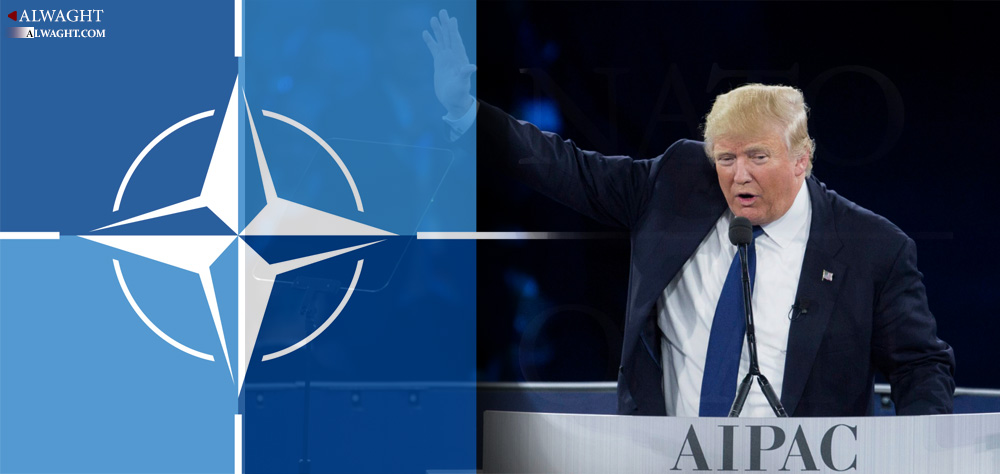Alwaght-United States' president-elect Donald Trump has astonished Washington's traditional allies by saying that the North Atlantic Treaty Organization (NATO) has become obsolete.
In a Monday joint interview with The Times of London and the German publication Bild , Trump added that NATO is obsolete because it has not been "taking care of terror," adding that, "I said a long time ago that NATO had problems."
"Number one it was obsolete, because it was designed many, many years ago. "Number two the countries weren't paying what they're supposed to be paying," adding that this was unfair to the US. Trump said he will also offer to end sanctions against NATO's main foe, Russia, in return for a nuclear arms reduction deal with Kremlin.
In reaction, President of France, Francois Hollande insisted that the EU "has no need for outside advice" on its affairs while his Foreign Minister Jean-Marc Ayrault reacted bluntly by saying the most appropriate response to Trump's stances was simple – Europeans uniting. In Berlin when asked about Trump's criticisms, Chancellor Angela Merkel said "We Europeans have our fate in our own hands."
Trump’s predictable unpredictability
Trumps remarks over the last few months, during his controversial campaign and after his disputed victory in the US presidential elections, point to a foreign policy which will be quite unpredictable. Indeed, the most predictable characteristic in Trump’s foreign policy is its unpredictability. On the 20th of January Trump is set to be inaugurated amid serious concern within the European Union and other US allies in the world. Trump’s unpredictability is unsettling for Washington’s allies in a volatile world and will be a factor in the inevitable decline of the US as a global power.
Trump predicts EU Collapse
In his interview, Trump praised Britain as “smart” for opting out of a European Union that he believes is dominated by Germany and on the brink of collapse. Trump pointed out that other countries could follow Britain and leave the EU.
Elsewhere in his remarks, the incoming US president lashed out at Merkel's 'catastrophic' open-door migration policy. He said: “I do believe this, if [EU countries] hadn't been forced to take in all of the refugees, so many, with all the problems that it entails, I think that you wouldn't have a Brexit”. Former French Prime Minister Manuel Valls even went as far to compare his comments to a "declaration of war on Europe."
Iran Nuclear Deal, source of EU, US tensions
Another point of divergence between Trump and EU revolved around the Iran nuclear deal otherwise known as the Joint Comprehensive Plan of Action (JCPOA). The deal was signed by Iran and the P5+1 group of countries, which included the five permanent members of the United Nations Security Council - the United States, France, Britain, Russia and China plus Germany - signed the JCPOA on July 14, 2015 and started implementing it on January 16, 2016. Trump has blasted the agreement as "one of the dumbest deals I have ever seen” and even threatened to shred it once he enters the White House. EU foreign policy chief Federica Mogherini has reiterated that Brussels fully supports JCPOA saying it provides benefits for all. Mogherini’s remarks are a thinly veiled warning to Trump that if he pursues his isolationist policies and unilaterally revokes the nuclear agreement with Iran, he would be abandoned by Washington’s European allies.
US, EU fault lines
The stark differences between Trump and the US point to major fault lines between the two sides and one of the reasons is that Trump has been sloganeering without having knowledge of the realities he will face once he occupies the White House.
The incoming president is yet to realize that the EU-US ties are strategic and therefore once he sits at the oval office the gap between the two sides are expected to narrow. However, if Trump maintains his current unpredictable approach, several scenarios on EU-US ties are bound to emerge.
The inevitable outcome of Trump’s isolationism will be a more independent EU especially in security affairs which will result in a weakened NATO and the formation of a new security organization in Europe. With Britain exiting the EU, it is clear European countries will in future lack a unified voice on international affairs. A new center of power in Europe devoid of Washington’s influence will lead to fundamental changes in international relations and mark the decline of the US hegemony.
There is a probability that Trump will drop some of his contentious stances but one thing is for sure, EU-US ties will never be the same again.



























